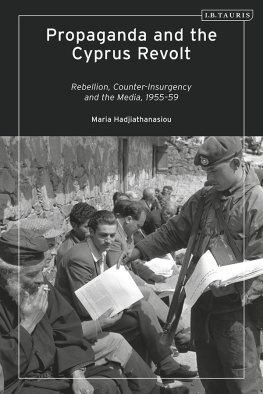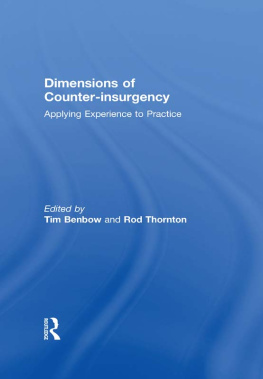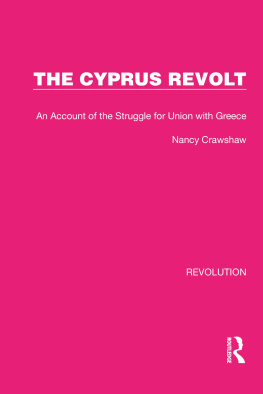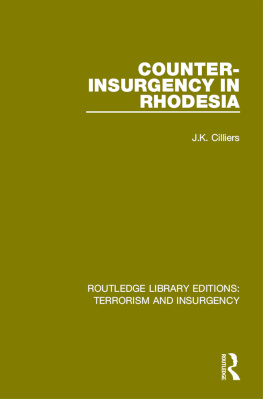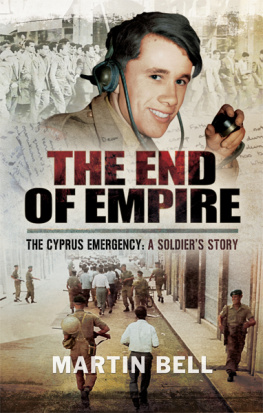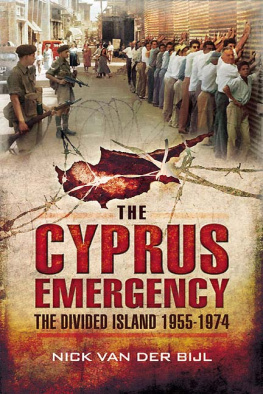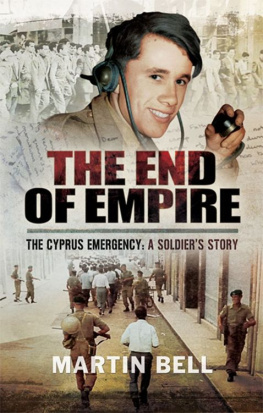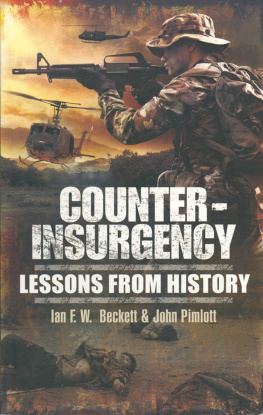The conflict fought in Cyprus between Greek Cypriot fighters and British security forces is usually dated to the four years between 1955 and 1959. Most of the Islands Greek Cypriot majority wanted their colonial relationship with Britain to end; many favoured union (Enosis) with the Greek motherland, and some, particularly the young, were prepared to fight for these goals. Within the British Empire, Cyprus was something of an anomaly. A classic garrison colony, its shoreline nestling close to the Arab world, its base facilities and listening stations were becoming more, not less strategically significant over time. The violence in Cyprus, often depicted as an asymmetric war between local guerrillas, British soldiers and police, ran far deeper than this more limited contest suggests, leaving enduring legacies of sociocultural division, of communities and families torn apart. We now have abundant evidence and, thanks to works like this one, more continues to emerge of systematic rights abuses. Understandably perhaps, histories of these episodes, and of the conflict more generally, have tended to dwell longest on the conduct of the revolt and its suppression. But the contest to determine the future of Cyprus was not wholly a matter of bombs, bullets and beatings. Neither armed struggle nor the punitive restrictions of a four-year security clampdown definitively won out. Ultimately, it was the illegitimacy of Britains colonial grip on Cyprus, as well as the methods employed to sustain it, that placed the island under hostile global scrutiny. This was a war of words and images. Sworn statements, photographs and news footage, grainy radio broadcasts heard on transistor radios, these were the audiovisual media of contested decolonization. The competing narratives about what was happening and why, the searing imagery of violence, much of it perpetrated against civilians and children, and the impassioned arguments in pamphlets, in the press and in the courts over rights claimed and rights denied: all of these things resonated locally and transnationally. In such volatile circumstances, the power, not just to coerce but to persuade, was what mattered most. It is this power that this book explores.
Maria Hadjiathanasious journey through the Cyprus revolt takes us to entirely new evidential and conceptual terrain as she charts the propaganda war fought between the British colonial authorities and their Greek Cypriot opponents in EOKA and other pro-Enosis groups. Advancing carefully, sometimes along, but frequently against, the archival grain, the book capitalizes on two bodies of evidence. Their contents tell very different stories or, more often, the same stories very differently. First are the British Colonial Office files that formed part of the so-called Migrated Archive, a vast collection of records, much of it relating to colonial repression. Thanks to the efforts of historians David Anderson, Caroline Elkins, Huw Bennett and others, these materials have at last been made available to researchers. Second is the archive for the Historical Memory of the Struggle in Nicosia, a combination of Greek-language sources, locally retained colonial records and a panoply of EOKA materials. These records, some British, some Cypriot, certainly work to persuade. Their arguments come freighted with the cultural presumptions, the ideological claims and the policy objectives of their authors. Yet propaganda, as Hadjiathanasiou reminds us, is more than an effort of political persuasion. The evidence adduced to support it is selective. The mediums used to advance it are as varied as the recipients who read, hear or see it. To maximize their effectiveness, propagandist messages must be cut to the cloth of their audience. The most successful propaganda does not come off the peg; it is tailored. Its design may be simple; it may be sophisticated; to succeed, it must be relentless. Propagandists dont just relate information; they weaponize it: to convince others to do their bidding.
Finding an analytical path through such material is hard work. A great strength of this book lies in the care with which it triangulates opposing accounts of key episodes, landmark legal cases and mounting social protests as the Cyprus revolt developed. British propaganda efforts, sometimes half-hearted, often half-baked, were additionally hidebound by an institutional disdain for psychological warfare and the mind games such tactics implied. Britains propaganda efforts seem, as a result, to have been a matter of catch-up, lagging hopelessly behind in trying to countermand the claims of the Orthodox Church, the Athens government, EOKA and its political wing, PEKA. More fundamentally perhaps, what emerges in the pages to follow is the dawning realization that the British simply lacked an authentic or persuasive propagandist message for the Greek Cypriot majority. Appeals to a safer political stewardship or a more stable economic future were hardly a match for the call to Hellenic ethno-religious unity and the attendant end of colonial oversight. If the effectiveness with which EOKA and its supporters pilloried British propagandist claims emerges powerfully, so do the attempts made by some unlikely British propagandists, among them the writer Lawrence Durrell, and the Director General of Information Services and psychological warfare in Cyprus Leslie Glass, to make the case for a British presence. It all makes for a fascinating study and a rewarding read.
Martin Thomas, Professor of Imperial History, University of Exeter

